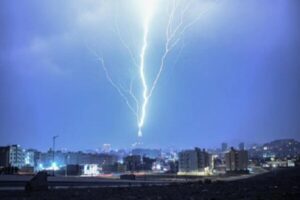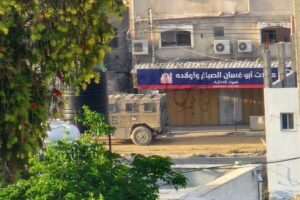By Xavier Villar
Sports often serve as a reflection of society at large. In particular, football has evolved into a microcosm through which one can analyze a specific society, its ideological foundations, its ethical-political horizons, and the citizenry’s response to all that has been mentioned.
In the specific case of Israel, the football team that best represents the ideological foundations upon which the colonial entity is based is Beitar, considered “the most racist team in the world.”
On October 7, following Hamas’s operation against the Zionist entity, a group of radical Beitar fans known as “La Familia” reportedly visited a hospital after hearing that a wounded Hamas resistance fighter was being treated there.
The group entered the hospital, traversed all floors, and demanded that the patient be handed over to them, chanting slogans such as “Death to Arabs” and “Death to terrorists.”
This group, established in 2005, espouses a clear anti-Arab and Islamophobic ideology. It is classified as an “ultra” group by both local media and Western media outlets.
To facilitate its categorization as an ultra group, it is often recalled that during the wave of anti-regime protests since at least 2020, La Familia racists aligned themselves with the incumbent Benjamin Netanyahu regime in Tel Aviv and took to the streets to assault both journalists and protesters.
The so-called existence of progressive Zionists is considered by many as a settler-colonial myth.
In recent polls, there was an overwhelming majority of the Israeli settler population who believe that their armed forces are using “too little firepower in Gaza.”
Only about 1.8 percent of the population considered that the Zionist occupation forces are “overstepping” in what they are unleashing on the Gaza Strip.
Given the data, it can be argued that Zionist society and La Familia supporters represent two sides of the same colonial violence. From a liberal perspective, there will be an attempt to push the myth that Beitar fans are a violent and racist minority that does not represent the entirety of the Israeli population.
However, this view does not take into account how, due to the overt racism of Beitar fans, the rest of the Zionist population may continue to benefit from colonial occupation without feeling guilty about it.
This implies that all settlers benefit, directly or indirectly, from colonial occupation. In other words, regardless of the distinction between supposed ultras and progressives, all of them gain benefits from the settler colonial occupation and the brutality inflicted on the Palestinians.
From a critical standpoint, establishing a division between “extremist ultras” and Zionist progressivism serves to conceal the political and epistemic reality of the Zionist colonial project in Palestine.
The primary objective of settler colonialism is not the enslavement or exploitation of the indigenous population but rather access to their territory.
This access to Palestinian territory is not an exclusively ultra or far-right project, as suggested by the liberal perspective. In fact, the conquest of Palestine has its roots in the policies of leftist groups like Matzpen, which viewed Zionism as an imperial project.
In this regard, it is crucial to recall that sociologist Baruch Kimmerling emphasized the centrality of the Zionist labor movement in the colonization project.
Contemporary “progressive” Zionism has its roots in what is known as labor Zionism, considered the left-wing and socialist branch of the Zionist movement that emerged over a century ago and played a pivotal role in forming the Zionist entity.
Since the establishment of this illegitimate entity, progressive Zionism has manifested in the policies of successive regimes considered left-leaning, as well as in the missions of other organizations, lobbying groups, political parties, and academic networks and institutions.
This so-called “progressive” Zionism enjoyed ideological hegemony for many decades after 1948.
However, seen from the perspective of its victims, the Palestinians, the distinction between “progressive” and “conservative” Zionism is merely an internal matter that does not alter the colonial situation they face on a daily basis.
This “progressive” Zionism is also part of settler colonialism and, as such, shares responsibility for the Nakba of 1948 and the ongoing war on Gaza, contributing to the suffering of the Palestinian people.
From a historical-political perspective, the foundations of this brand of Zionism can be summarized in four points:
– The creation of the Zionist entity was deemed the sole method to ensure Jewish security and resolve the Jewish exile.
– Jews were believed to have inherent, biblical, and sovereign claims to the land of Palestine.
– The Zionist project was portrayed as a heroic and miraculous endeavor that brought the torch of modernization and civilization to the entity.
– The so-called “War of Independence” in 1948 was considered necessary, and the outcomes of the war, namely the expulsion of over 750,000 Palestinians from their lands and homes and the destruction of Palestine, were seen as natural and should be accepted.
The Zionist colonization project unites both those considered “conservatives” and “progressives,” underscoring that the alleged differences between them are merely disputes that do not jeopardize or question the survival of the Zionist colonial state.
In other words, while there may be differences in discourse between members of the two groups, we find ourselves within Wittgenstein’s notion of family resemblance.
In other words, despite noticeable differences, everyone falls under the same discourse. Agreements and disagreements within that diverse group are expressed in the same language — that of colonialism.
Therefore, it can be concluded that the racism and Islamophobia of Beitar cannot be classified as marginal or minority views. Members of La Familia serve a clear political function: to enable and facilitate colonial violence while shoring up the “progressive” Zionist fantasies.
Xavier Villar is a Ph.D. in Islamic Studies and researcher based in Spain.
(The views expressed in this article do not necessarily reflect those of Press TV)




